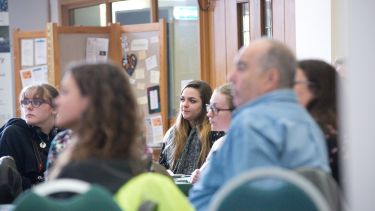Living life to the fullest
A new research project that will let children and young people with life limiting or life threatening conditions tell their own life stories through the arts has received funding from the Economic and Social Research Council (ESRC).

The Living Life to the Fullest project is being led by Dr Kirsty Liddiard and Professor Dan Goodley from the School of Education, along with colleague Dr Katherine Runswick-Cole at the Manchester Metropolitan University.
The three-year project has received £544,000 in funding from the ESRC.
Children and young people on the project will use the arts, including painting, drama, film making and sketching, to tell their stories.
Their works will then be used to help raise visibility and awareness of how children and young people see themselves.
Dr Kirsty Liddiard, co-investigator on the project, said: “Our society has some problematic ideas about disability and disabled people’s lives, particularly children with life limiting or life-threatening impairments whose lives can be shorter than most.
“Often people think that disabled children and young people live tragic and unhappy lives without opportunities for play, socialising and friendships.
Living Life to the Fullest will give opportunities to children and young people to talk about their lives in a new ways - as joyful, creative, fun, challenging, but liveable just like anyone else. We believe it is incredibly important to make sure the voices of children and young people are heard as knowledge about life limiting and life threatening impairments rarely comes from children and young people themselves.
Dr Kirsty Liddiard
Project Co-investigator
The project commenced in April 2017 and completes in 2020. The research will be co-produced with community research partners, Purple Patch Arts, DMD Pathfinders and Good Things Foundation.
Living Life to the Fullest is a flagship project of the University of Sheffield's newest research institute, the Institute for the Study of the Human (iHuman).
